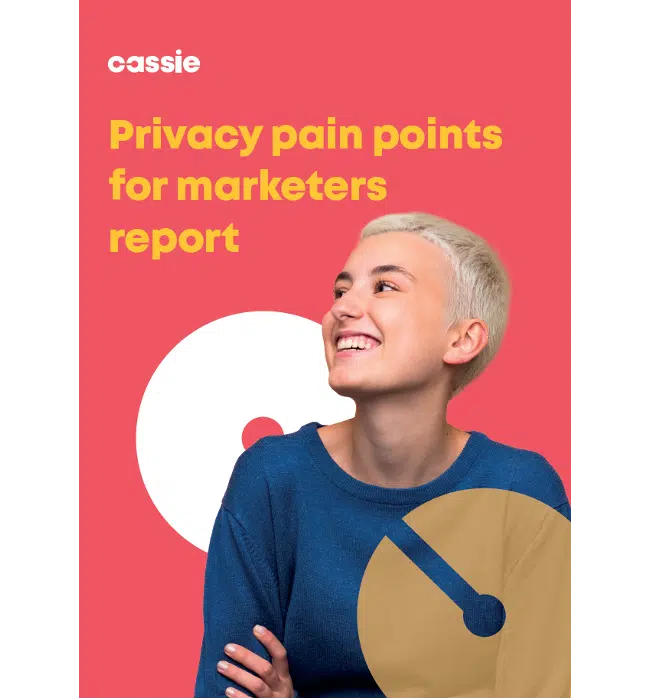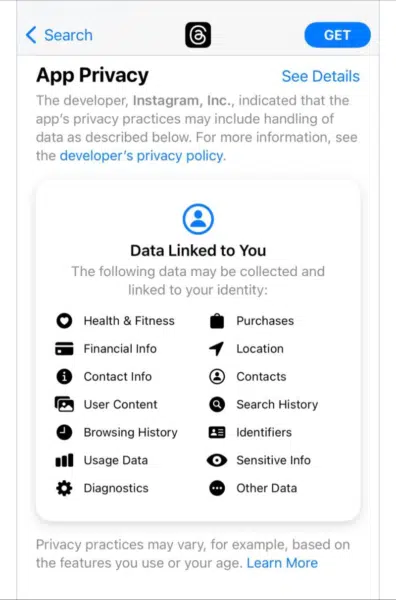The dark side of Threads: Dark patterns and data privacy concerns
Posted: July 11, 2023
Have you joined Threads yet?
In a matter of hours, the new-kid-on-the-block social media platform had reportedly gathered over 10 million sign ups. It’s now at 100 million plus and climbing, making it the fastest growing app in history. That’s without being available in the EU due to data privacy concerns…
New social media platforms come and go, though not many manage to stick around as a preferred channel we keep coming back to.
But it’s looking like Threads might be here to stay, with the backing of powerhouse Meta behind it making sure it’s intuitive to use and get started.
With millions flocking to the Twitter-rival, we’re taking a closer look at some of the clever tactics they’ve used to draw users in. In particular, the dark patterns that are potentially manipulating unwitting users into doing things like signing away the rights to sell all their data.
Unravelling threads data privacy concerns
Red flags have been raised precisely because it’s built by Meta. They’ve become somewhat infamous for tracking and collecting data with micro-targeting behavioral advertising tools, with Facebook under fire for processing personal data under the basis of performance of a contract was deemed unlawful.
Add to this Facebook’s recent GDPR fine relating to data exports and standard contractual clauses, you’d be forgiven for feeling a little wary about how Threads is going to protect and handle your data.
From the outset, Threads collects health and financial data, precise location, browsing history, contacts, search history and other sensitive information, without any restrictions or limitations on its usage or sale.
Threads does not deem any of these data points as sensitive, part of the reason why it has not launched in the EU. It is essentially illegal in the EU because of this. There are currently no plans to update Threads in line with the GDPR, which is an alarm bell in itself for anyone that values their privacy.
What is a dark pattern?
A dark pattern refers to a user interface design technique that is intentionally crafted to manipulate or deceive users into taking certain actions that they may not have intended or desired. Dark patterns are typically used to achieve the goals of the company or website at the expense of the user’s best interests.
These patterns exploit psychological principles and design elements to influence user behavior, often leading to unintended purchases, involuntary sign-ups, or hidden costs. They can be found on various digital platforms, including e-commerce websites, mobile apps, and online services.
Dark patterns can erode trust, damage user experiences, and harm a company’s reputation. Ethical design practices prioritize transparency, user empowerment, and clear communication, aiming to provide a positive user experience and build long-term customer relationships based on trust and mutual benefit.
Under the GDPR, organizations must ensure that their data processing activities are conducted in a transparent and lawful manner. Specifically, Article 5 of the GDPR outlines the principles of “lawfulness, fairness, and transparency.” This means that individuals should have clear and easily understandable information about how their personal data is being collected, used, and processed.
Dark patterns that intentionally deceive or manipulate users can be seen as violating the principles of fairness and transparency.
Businesses need to be aware of the potential risks of employing dark patterns. The US Federal Trade Commission (FTC) recently made a case against retail giant Amazon, accusing them of employing dark patterns to sign up and retain Amazon Prime customers.
Dark patterns in Threads:
1. The ties to Meta
If you’re in the tech space you’ll likely be fully aware of the rebranding story behind Facebook and Meta, as well as the purchasing of Instagram into the brand umbrella. However, many users probably don’t know (or maybe even care) that Meta emerged partly due to the countless legal trials and privacy infringement fines that saw the demise of Facebook.
So, from a brand positioning sense it’s clear why Meta is heavily using the Instagram brand to launch and promote Threads. But this means a lot of people won’t make the link to the tarnished brand of Facebook, thus not considering the data implications further.
2. The ties to Instagram
You need to have an Instagram account in order to access Threads. Whilst this makes setting up your profile very easy, it means you cannot have a Threads account without also providing an Instagram account.
Once you’re set up, you’ll be told that if at any point you no longer want to have a Threads account, you’d also have to delete your entire Instagram account. If you don’t want to do that, your only option is to ‘deactivate’ your Threads account, with your profile and all the data linked to it still accessible to Meta.
3. Instant access
Your Threads account was actually pre-set up for you, with Instagram offering pre-reserved handles. All pretty great in terms of user experience, but the dark side comes into play when this linked account set up also means that should your Instagram account get hacked, your Threads account goes with it, and vice-versa.
4. Cross-platform promotion
Meta is using every trick in the book to cross-promote Threads via Instagram, with posts, stories and DMs intertwined with snazzy graphics and quick share links. Whilst this isn’t necessarily a dark pattern – arguably it’s clever marketing – it does highlight the built-in opportunities that Threads has over competitors like Mastodon and Blue Sky that haven’t had anywhere near as much coverage or uptake despite being around for longer.
5. Only apps
Whenever you share Threads content via Instagram, your followers are prompted to sign up. This is further cemented by the lack of a desktop version of Threads, subtly forcing users to download the app version, which in turn has greater access to all of your data. Apps are also notorious for dark patterns, pinging your phone all day long via notifications. When you sign up to Threads you manually set up your notification preferences again, with the app hoping you’ll opt for the ‘Allow all’ settings so they can remind you to revisit the app every few minutes.
6. All your Threads belong to Meta
The dark pattern we should all be taking note of is how it carefully and quietly informs users of the types of data it’s got access to. As mentioned at the start of the article, the app has access to your health data, financial data, and your location without any restrictions. This type of data aggregation has implications for your data being sold to the highest bidder, but where states and countries where certain medical concerns like abortion, sexuality and beliefs are illegal, it becomes even more concerning.
Is Threads a threat to data privacy?
In the intricate tapestry of social media platforms, Threads has emerged as a formidable player. Its rapid growth and endorsement by influential figures may lull people into a false sense of security. As we’ve explored, beneath the surface lies a network of dark patterns carefully woven into its design.
From the ties to Meta’s controversial past to the mandatory link with Instagram, Threads presents itself as a seamless experience while concealing the potential pitfalls. The cross-platform promotions, exclusive app availability, and unbounded data collection further underscore the intentions behind this new social media venture.
As users and as businesses looking to utilize new channels, it’s vital we remain vigilant and informed about the techniques employed by platforms like Threads. Consumer’s privacy and autonomy deserve protection, and we must recognize and challenge the deceptive practices that undermine our rights.
In an era where data is a highly sought-after commodity, we must demand transparency, fairness, and ethical design. By shining a light on dark patterns and holding platforms accountable, we pave the way for a more user-centric digital landscape—one that prioritizes trust, respect, and the empowerment of individuals.

85% of marketers are concerned about the potential impact of data privacy legislation changes
Changes in data privacy legislation ending third-party cookies could require us to rethink our strategies for reaching our customers. Read our Privacy pain points report to learn about marketers’ growing data privacy concerns.


